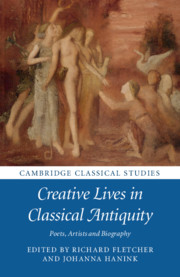Book contents
- Frontmatter
- Contents
- List of contributors
- List of illustrations
- Part I Opening remarks
- 1 Orientation: what we mean by ‘creative lives’
- 2 ‘Lives’ as parameter: the privileging of ancient lives as a category of research, c. 1900
- Part II Reviving dead poets
- Part III Lives in unexpected places
- Part IV Laughing matters and Lives of the mind
- Part V Portraits of the artist
- Works cited
- Index
1 - Orientation: what we mean by ‘creative lives’
from Part I - Opening remarks
Published online by Cambridge University Press: 01 December 2016
- Frontmatter
- Contents
- List of contributors
- List of illustrations
- Part I Opening remarks
- 1 Orientation: what we mean by ‘creative lives’
- 2 ‘Lives’ as parameter: the privileging of ancient lives as a category of research, c. 1900
- Part II Reviving dead poets
- Part III Lives in unexpected places
- Part IV Laughing matters and Lives of the mind
- Part V Portraits of the artist
- Works cited
- Index
Summary
In Tom Stoppard's 1997 play The Invention of Love, the character of Oscar Wilde offers A.E. Housman this reflection on the power and primacy of biographical fiction:
Art cannot be subordinate to its subject, otherwise it is not art but biography, and biography is the mesh through which our real life escapes. I was said to have walked down Piccadilly with a lily in my hand. There was no need. To do it is nothing, to be said to have done it is everything. It is the truth about me.
In reimagining Housman, Wilde and their interactions, The Invention of Love creates and participates in the very sort of potent biographical fiction upon which ‘Wilde’ here reflects. This is a brand of fiction that has been in currency since antiquity: like other creative spirits, poets have always inspired their audiences to tell stories about them. But they have also long been prone to provoking especially ‘creative’ forms of biography – biography that takes bold and fantastical license with a life and so transforms that life into an artistic object in its own right. This volume, rather than attempt to reconstruct the ‘real’ lives of any ancient poets, artists or creators, takes as its subject precisely the mesh of fictional biography as described by, and exemplified through, Stoppard's Wilde. Though the barest facts about the lives of ancient artists and intellectuals may have irrevocably slipped from our grasp, each of the contributions here begins from the shared premise that fictional biographies are often themselves finely wrought, and worthy of examination as telling receptions of creative work. Our case studies here thus aim to shed light upon how, even from its earliest days, the act of producing biography about creative individuals often constituted a self-consciously creative act in itself.
In recent years the various fields of literary studies have seen an explosion of general interest in the study of biography and ‘life writing’ (a more comprehensive term that extends to all manner of life narratives). The practice of biography is also thriving in literature, film and on the stage. Tony Harrison's Fram (2008) and Alan Bennett's The Habit of Art (2009) mark but two further examples of plays that engage in their own brands of ‘creative’ biography, taking dramatic impetus from the life-stories of people known for their accomplishments in art and ideas.
- Type
- Chapter
- Information
- Creative Lives in Classical AntiquityPoets, Artists and Biography, pp. 3 - 28Publisher: Cambridge University PressPrint publication year: 2016

